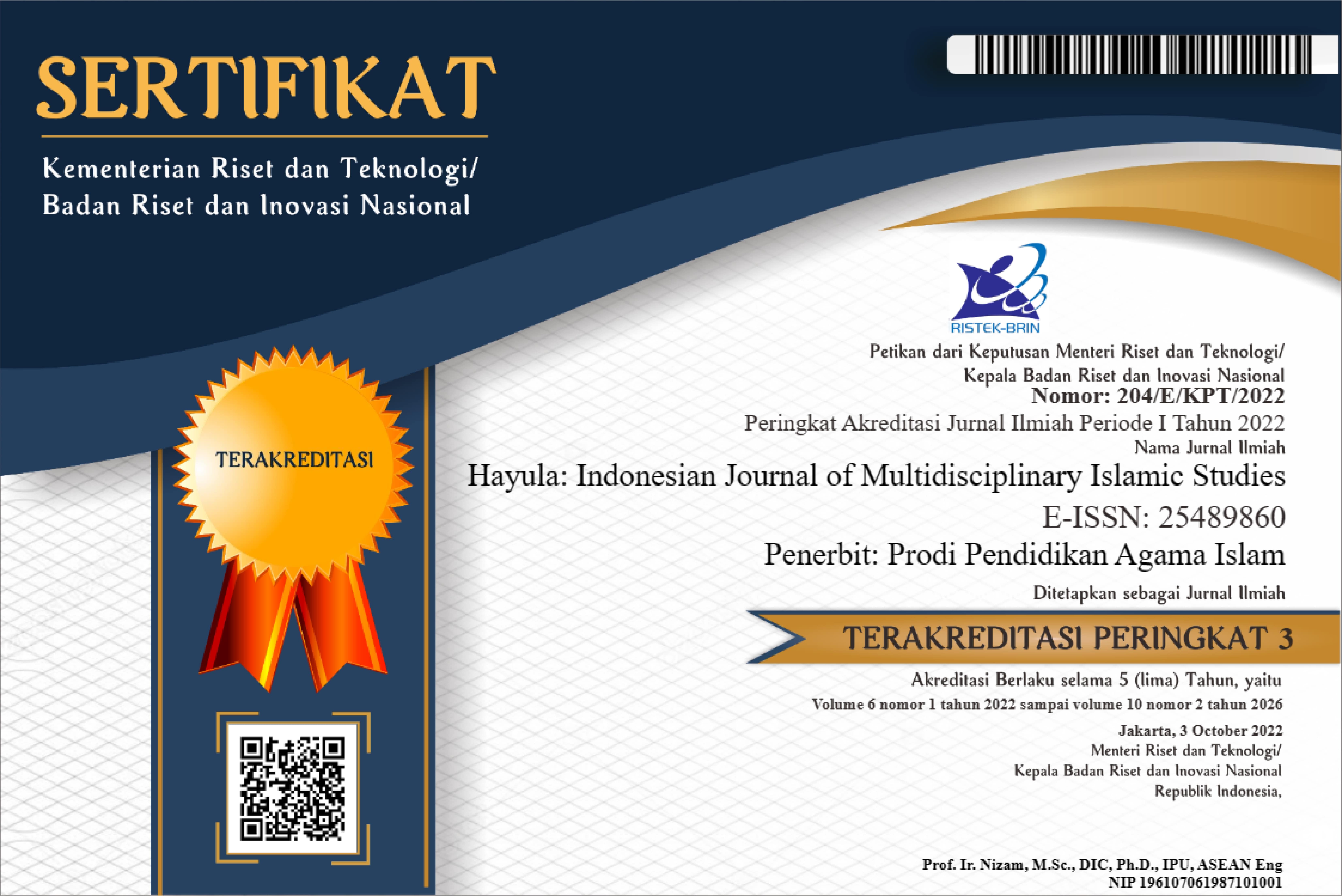Ma‘had 'Aly and the Challenge of Modernizing Islamic Education in Indonesia
DOI:
https://doi.org/10.21009/hayula.003.2.04Keywords:
Pesantren Luhur, Modernization of Islamic Education, Curriculum Development, Charismatic KiyaiAbstract
This paper discovers one of the pesantren models in Indonesia that is considered understudied, the University Level of Pesantren (Ma‘had ‘Aly), pesantren which santris are the university students. Particularly, this paper explains the struggle of Pondok Pesantren Darus Sunnah in facing the challenges of modernizing Islamic Education in Indonesia. Over time, the majority of pesantren adopted modernization to meet the demands from the society and to gain broader recognition from the government. However, the Pondok Pesantren Darus Sunnah is one of the pesantrens that delay the modernization. This paper aims at explaining the reasons for the reluctance of Pondok Pesantren Darus Sunnah to respond to the modernization. To answer the above question, this study employs a qualitative approach with auto-ethnography as the main data-collection tool. The author takes the advantage of the author's experience while being a santri and ustadz at the Darus Sunnah Islamic Boarding School with observations as additional data collection methods. In brief, this study suggests that the Pondok Pesantren Darus Sunnah currently rejects modernization because it reduces the authority and traditional identity of the pesantren. Pondok Pesantren Darus Sunnah prefers to keep the traditional pesantren in line with the advice of the charismatic founder of the pesantren. The traditional model of pesantren has been proven to have produced qualified alumni who play significant role both at national and international levels. This paper also proposes degree equivalence as a solution to this issue of modernizing Islamic education institution.
References
Anwar, M. (2013). Modernisasi Pesantren: Pergeseran Tradisi dan Pudarnya Kyai. Hunafa: Jurnal Studia Islamika, 10, 19-42.
Aulia, R. N., Mardhiah, I., Gunawan, A., Isnaini, D. E. N., Firdaus, M., & Narulita, S. (2018). Pesantren-based Environmental Management in Equatorial Areas. Paper presented at the AIP Conf. Proc. AIP Conference Proceedings.
Azra, A. (1999a). Esei-esei intelektual Muslim dan pendidikan Islam: Logos Wacana Ilmu.
Azra, A. (1999b). Pendidikan Islam: tradisi dan modernisasi menuju milenium baru: Logos Wacana Ilmu.
Bashori, B. (2017). Modernisasi Lembaga Pendidikan Pesantren. Jurnal Ilmu Sosial Mamangan, 6(1). doi:10.22202/mamangan.1313
Basri, H. H. (2014). Keragaman Orientasi Pendidikan di Pesantren. Dialog, 37(2), 207–220.
Brewer, J. D. (2000). Ethnography. Philadelphia, PA: Philadelphia, PA : Open University Press.
Bruinessen, M. v. (2008). Traditionalist and Islamist Pesantrens in Contemporary Indonesia. In F. A. Noor, Y. Sikand, & M. v. Bruinessen (Eds.), The Madrasa in Asia, Political Activism and Transnational Linkages, 2008 (pp. 217). Amsterdam: Amsterdam University Press.
Bryman, A. (2008). Social Research Methods. Oxford: Oxford University Press.
Detik. (2016). Mantan Imam Besar Masjid Istiqlal KH Ali Mustafa Yaqub Wafat. Retrieved from https://news.detik.com/berita/3198463/mantan-imam-besar-masjid-istiqlal-kh-ali-mustafa-yaqub-wafat
Dhofier, Z. (1980). Tradisi pesantren: Studi tentang Pandangan Hidup Kyai. Jakarta: Lembaga Penelitian, Pendidikan, dan Penerangan Ekonomi dan Sosial.
Hafid, H. (2018). PENDIDIKAN PESANTREN DAN TANTANGAN MODERNISASI. Jurnal Kariman, 1(01), 47-66.
Hasbillah, U. (2019). Karakter Santri Dalam Filosofi Logo Darus-Sunnah: Mengenang 1000 Hari Wafatnya Sang Kiai. Retrieved from http://darussunnah.id/karakter-santri-dalam-filosofi-logo-darus-sunnah-mengenang-1000-hari-wafatnya-sang-kiai/
Hayati, N. R. (2015). Manajemen Pesan dalam Menghadapi Dunia Global. TARBAWI, 1(2), 97–106.
Irham. (2015). Pesantren dan Perkembangan Politik Pendidikan Agama di Indonesia. Jurnal Pendidikan Agama Islam-Ta’lim, 13(1), 93–118.
Juandi, W., & Yasid, A. (2016). Discourse of Islamic Jurisprudence in Indonesian Ma'had Aly between Taqlidy and Manhajy. Journal of Indonesian Islam, 10(1). doi:10.15642/jiis.2016.10.1.139-158
Katni, & Saputro, A. D. (2017). The Role of Habitus in Developing Intellectual Capital Student at Ma'had Aly Al Furqon, Ponorogo. Muaddib : Studi Kependidikan dan Keislaman, 7(2). doi:10.24269/muaddib.v7i2.799
Kesuma, G. C. (2017). Refleksi Model Pendidikan Pesantren dan Tantangannya Masa Kini. Tadris: Jurnal Keguruan dan Ilmu Tarbiyah, 2(1). doi:10.24042/tadris.v2i1.1740
LeCompte, M. D., & Schensul, J. J. (1999). Analyzing and Interpreting Ethnographic Data (Vol. 5). Walnut Creek, Calif: AltaMira Press.
Maksum, A. (2016). Model Pendidikan Toleransi di Pesantren Modern dan Salaf. JPAI Jurnal Pendidikan Agama Islam (Journal of Islamic Education Studies), 3(1), 81.
Pesantren, D. S. (2016). Profil Khadim Mahad. Retrieved from http://darussunnah.id/profil-khadim-mahad/
Sidiq, U. (2013). Pengembangan Standarisasi Pondok Pesantren. Nadwa, 7(1). doi:10.21580/nw.2013.7.1.544
Soebardi. (1976). The Palace of Islam. In M. Kay (Ed.), Study Indonesia History. Australia: Patman.
Stake, R. E. (1995). The Art of Case Study Research. Thousand Oaks: Sage Publications.
Wajdi, F. (2018). The Discourse of Muhammadiyah and Nahdlatul Ulama with Considerations of Geertz’s Religion of Java. Hayula: Indonesian Journal of Multidisciplinary Islamic Studies, 2(1), 45-60. doi:https://doi.org/10.21009/hayula.002.1.04
Wolcott, H. F. (1990). Making a Study "More Ethnographic". Journal of Contemporary Ethnography, 19(1), 44-72. doi:10.1177/089124190019001003
Yin, R. K. (2009). Case Study Research: Design and Methods (Vol. 5.). Thousand Oaks, Calif: Sage Publications.
Zamroji, M. (2017). Modernisasi Sistem Pendidikan Pondok Pesantren. Muróbbî: Jurnal Ilmu Pendidikan, 1(1), 33-63.
Ziemek, M. (1986). Pesantren dalam Perubahan Sosial. P3M, Jakarta.
Zulhimma, Z. (2013). Dinamika perkembangan pondok pesantren di Indonesia. Darul 'Ilmi: Jurnal Ilmu Kependidikan dan Keislaman, 1(2), 165-181.
Downloads
Published
How to Cite
Issue
Section
License
Authors who publish with this Journal agree to the following terms:
- Author retain copyright and grant the journal right of first publication with the work simultaneously licensed under a creative commons attribution licensethat allow others to share the work within an acknowledgement of the work’s authorship and initial publication of this journal.
- Authors are able to enter into separate, additional contractual arrangementfor the non-exclusive distribution of the journal’s published version of the work (e.g. acknowledgement of its initial publication in this journal).
- Authors are permitted and encouraged to post their work online(e.g. in institutional repositories or on their websites) prior to and during the submission process, as it can lead to productive exchanges, as well as earlier and greater citation of published works.
Users/public use of this website will be licensed to CC BY






